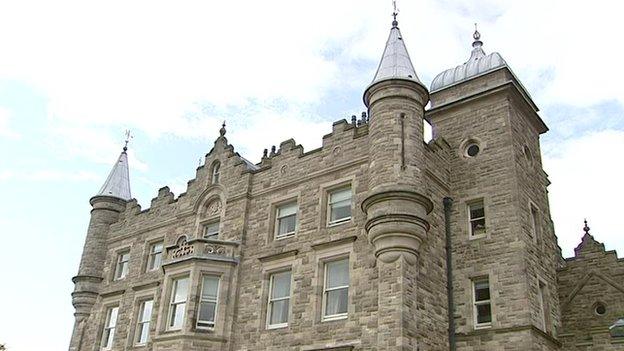Difficult decisions for NI Executive as spending power falls
- Published

The Northern Ireland Executive meetings are usually held in Stormont Castle
At a UK level, the last government cut day-to-day public spending by 9% over five years.
In cash terms, that reduced Stormont's spending power by more than £1bn between 2010 and 2015.
The Conservatives' plans involve a further cut of 7% over the first four years of the next Parliament with spending increasing in the last year.
So Stormont can expect its spending power to decrease again.
The precise cash amount will not be clear until the Conservatives lay out detailed spending plans.
That is because the money Stormont has to spend is determined by the Barnett Formula.
In crude terms, the formula means that if spending falls or rises on a particular public service in England, it will also change by a proportionate amount in Northern Ireland.
So if health and education spending continue to be largely shielded from cuts in England, that will help Stormont as those two areas form the vast majority of departmental spending in Northern Ireland.
But even if the Barnett formula means a smaller spending cut for Northern Ireland, compared to the UK as a whole, it will still mean a series of difficult decisions for the Northern Ireland Executive.
The cuts in Stormont's most recent budget have only begun to be implemented and more will now inevitably follow.
The Conservatives' plans also imply some radical cuts to welfare and social security.
They say they will implement £12bn of cuts to the welfare budget by 2018, but so far they have only explained about £2bn of those cuts.
The party will not cut pensioner benefits and also seems to have promised not to cut child benefit.
That means the bulk of cuts would have to fall on housing benefit, tax credits or disability benefits.
Special treatment?
That potentiality creates a big problem at Stormont as the parties have not been able to agree to implement the last round of Westminster-initiated welfare cuts.
A deal seemed to have been reached late in 2014 as part of the Stormont House Agreement, but then collapsed at the last minute.
Sinn Féin said the plans for implementing the deal did not provide the levels of protection for claimants that they wanted; the DUP said Sinn Féin's demands were not part of the deal and were unaffordable.
As welfare is a devolved matter, the Stormont parties could, of course, fund a more generous welfare system but that would place spending for other services under even more pressure.
In the early stages of the election count, it looked as though there could have been a path to additional spending power for Stormont.
It seemed as if the Conservatives would need DUP support to form a stable government.
That could have given the unionist party leverage to get some additional money for the Northern Ireland Executive.
The party's East Antrim MP Sammy Wilson went on the BBC's election programme to tell David Dimbleby about Northern Ireland's "special economic circumstances" and the need for infrastructure spending.
But, with the latest forecast giving the Conservatives an overall majority, the prospect of any special treatment for Northern Ireland is receding.
In economic terms, the Conservative victory is a vote for smaller government and less public spending - that will inevitably have an impact on Stormont's budget.